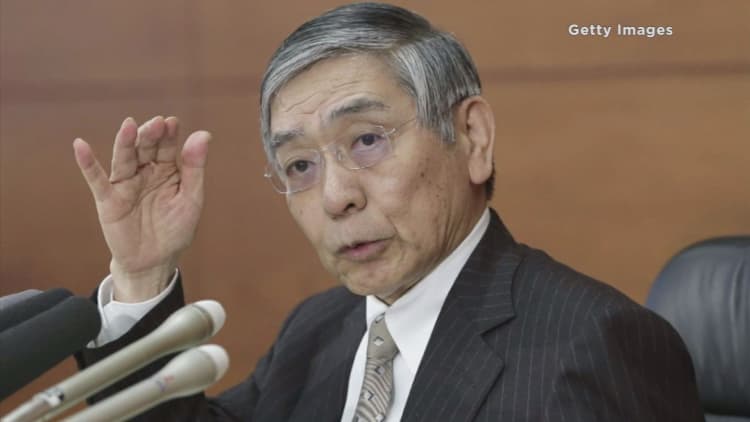
The Bank of Japan (BOJ) left monetary policy steady on Thursday, surprising several market players who were widely expecting a hefty dose of stimulus.
The central bank maintained its negative 0.1 percent deposit rate and its 80 trillion yen base money target. However, it did leave the door open to additional easing steps and said it will provide loans at zero interest rates to areas impacted by the recent Kyushu earthquakes.
BOJ Governor Haruhiko Kuroda told reporters at a press conference following the decision that the central bank remained committed to achieving its 2 percent inflation target in about two years.
But he ruled out the possibility of the BOJ directly financing the government, a policy also known as "helicopter money," Reuters reported. Such a move would be illegal under Japan's current legal system, he said.
Kuroda said the BOJ's surprise move on January 29 to start charging banks for the privilege of parking some of their excess funds wasn't criticized at the Group of 20 meeting, and he warned market participants that it would be wrong to assume the central bank could not cut rates deeper into negative territory, Reuters reported.
The BOJ governor also said the impact of negative rates on banks' earnings was also small, according to Reuters.
Kuroda added that he did not see any obstacles to the central bank's plan to buy government bonds, despite a sharp rally that has pushed prices to record highs.
At its meeting, the BOJ lowered its gross domestic product growth (GDP) forecast to 1.2 percent growth for the 2016-2017 fiscal year, from a previous estimate in January of a 1.5 percent expansion.
Disappointment over the bank's inaction sent the dollar-yen currency pair tumbling more than 2 percent to the 109 handle, sparking concerns of extended yen strength. Meanwhile, the benchmark Nikkei 225 stock index dropped 3 percent when it resumed trade following a lunch break.
Major banks, including Goldman Sachs and Bank of America Merrill Lynch, were betting for increased purchases of exchange-traded stock funds (ETFs) alongside interest rate cuts, a CNBC survey showed this week.
But the central bank simply isn't ready to ease again, Mitul Kotecha, head of Asia FX and rates strategy at Barclays told CNBC's "Street Signs" following the decision.
"There is a chance in July they may go deeper into negative rates and increase ETF buying but at the same time, they are shifting away from quantitative to qualitative easing so buying more JGBs [Japanese government bonds] is having less efficacy in terms of market impact."
JGBS, ETFs and Japanese real-estate investment trusts (J-REITS) are all part of the central bank's stimulus toolkit.
The two-day review, which kicked off Wednesday, was billed by HSBC as "the most closely watched meeting in recent memory," against a backdrop of a stronger currency, year-to-date losses on the Nikkei and economic damage from the Kyushu quakes.
Inflation data, a key factor shaping the BOJ's policy outlook, released before Thursday's market open also underpinned easing expectations. March consumer price inflation (CPI) slid 0.3 percent on-year, the first decline since May 2013 while core inflation—an indicator excluding fresh food—declined for the fourth straight month.
Thursday also saw the central bank cut its 2016-2017 forecast for core CPI growth to 0.5 percent from 0.8 percent previously.
"They are likely to take this opportunity to evaluate the impact of negative interest rates on the economy, while remaining mindful of the Upper House election in early summer," Maybank analysts said in a note, explaining the bank's decision to stand pat.
July's upper house election is seen as pivotal for the ruling Liberal Democratic Party, according to political pundits. A victory would embolden Prime Minister Shinzo Abe to amend the constitution and shed light on whether he will delay the second stage of the consumption tax hike, which is scheduled for 2017.
Barclay's Kotecha believes Abe is likely to delay the tax on expectations for slow consumer spending following the recent earthquakes.
- Reuters contributed to this report.


